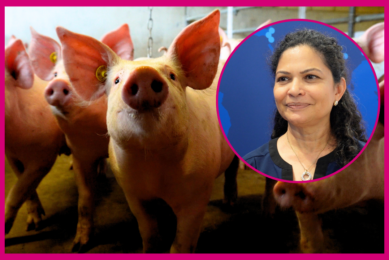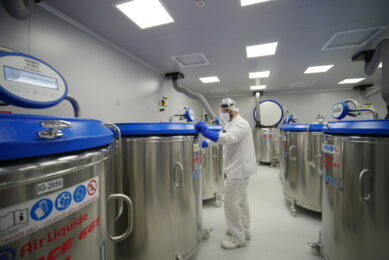CCPA’s ongoing search for better feed ingredients
![More than 700 diets per year are tested in the Euronutrition centre. Pictured is the pig ( station. [Photo: Philippe Caldier]](https://www.pigprogress.net/app/uploads/2021/04/001_590_rb-image-2712019-848x565.jpeg)
The CCPA Group has numerous subsidiaries and with about 50% of its sales at export, it counts on research and innovation to stand out. In addition, it offers pig farmers efficient and validated solutions from laboratory to farm level.
CCPA is short for the French ‘conseil et compétences en productions animales’ – which roughly translates as ‘advice and expertise in animal production’. For more than 15 years, phyto-expertise has been at the heart of the know-how of CCPA Group for all animal species, in particular for pigs.
CCPA has its feed plant in Janzé near Rennes, France, but the group has several other facilities: The Euronutrition monogastric experimental centre, managed with three partner companies, is one of the largest European centres for applied research about animal nutrition. It consists of four experimental centres, a laboratory, a feed plant and tests more than 720 diets per year in poultry, pigs and rabbits.
A laboratory of more than 1,400 m², specialised in animal nutrition and health. This was inaugurated on 13 January 2013 in Janzé. The analysis laboratory of the group was completely reorganised and enlarged, representing a € 1.4 million investment. This facility is one of the rare private French laboratories dedicated exclusively to the animal sector, with the specificity to work at the same time in animal nutrition and health; A national network of test farms for the validation of innovations in real-life farm conditions.
Laurent Roger, head of the CCPA Group’s pig department, says, “Feed represents 65 to 70% of the pig production cost and, in a context of big variations of raw materials prices, feed efficiency management becomes strategic.” In this context, a better characterisation of raw materials and a better knowledge of animals’ needs are the priorities of the team of three persons he runs.
New matrix
Key pig focus areas for the CCPA Group have been numerous for a decade: digestive safety, demedication, profitability and performances. In 2011-2012, the Pig Department of CCPA Group, in collaboration with the Formulation Department, brought some changes in its formulation matrix, called ‘Net Energy Pork’, aiming to save on feed formulation.
“This job results from the synthesis of many trials of digestibility of raw materials accomplished in the experimental station Euronutrition,” says Roger, adding that the new matrix allowed savings per tonne feed without negative side-effects. The new matrix takes into consideration the introduction of new raw materials such as brewer’s draff and other distillery co-products to the market.
In addition, a work has been accomplished in 2013 on the muscular store of the animals and the phosphorus, following better knowledge of the physiological process of digestion of the latter. Roger explains, “We adapted our formulations from the digestible phosphorus to the standardised digestible phosphorus, with an economy of mineral phosphates.” Hitherto, the real digestibility of the phosphorus had been underestimated.
An additional step is made in the research of an optimum formulation by including into the matrix a higher number of amino acids, among them leucine, isoleucine and histidine. Roger adds: “With a total of nine digestible amino acids, our matrix gained robustness, with a more efficient protein formulation.” Protein content in the finishing pig formulations dropped from 14.5-14.7 to 13.7-13.8 with at the end a better satisfaction of animal needs without performance losses.
Digestive safety
For ten years now, CCPA Group has implemented an ambitious research programme on animal nutrition and health interactions, called Axion. Fabrice Robert, head of the company’s R&D department, explains: “We were the pioneers of this new approach which consists of studying the relationship between nutrition and resistance of animals to their environment. The goal is to raise animals preserving their health status, by minimising the use of antibiotics.” Axion thus serves a true cross-platform, which also benefits from the expertise of species departments and of the animal health department of Deltavit laboratory.
The Axion programme led to the development of a complete range of Axion feed complements rewarding plant ingredients with specific biological effects and formulations adapted to the health status of the animals:
Ax’Écla – a first-age feed without antibiotics contributing to reduce the stress at weaning, divided in the brands Ax’Écla Adapt and Ax’Écla Intense;
Axion Imm’Ax – feed designed to maintain piglet growth at weaning;
ProActiv’Balance – combining a functional fibre and catechins; helping piglets to maintain a sustainable digestive balance;
Axion Sow’Ax – feed for lactating sows enhancing colostrum and milk production.
In order to further understand the intestinal mucosa of the piglet and its digestive physiology, the CCPA Group has been committed since last year to an R&D programme in partnership with the INRA in Toulouse.
Natévia approach
Another strategy worth mentioning is the global Natévia approach, aimed at helping sows produce heavier and more homogeneous piglets – a big support for feed producers and farmers in the hyperprolific sow management.
The increase of the litter size is linked with a decrease of the individual piglet weight and with an increase of heterogeneity. For every additional born piglet, the average weight at birth decreases about 40 g and the number of immature piglets increases linearly. However, the increase in the heterogeneity and the number of stillborns is a reflection of the increase of piglets affected by an intra-uterine delay of growth. The economic impact of these immature piglets is high, representing 22% of stillbirth causes. Moreover, those which survive have lower growth rates in post-weaning and fattening.
CCPA’s pig department offers a range of nutritional solutions with customised programmes and dietary levels. A range of nutritional supplements such as Deltamigo completes the feed approach. Enriched with vitamins, folic acid, biotin and fast carbs, it allows, during the flushing to improve the homogeneity of the ovular laying and facilitate nesting. Before parturition, it is used to enhance the vitality of piglets and facilitate farrowing.
As for the Axion programme or the global Natévia approach, the nutritional solutions proposed by the CCPA Group are in permanent improvement. Roger says, “All our research efforts will be boosted by the European ProHealth programme. This project opens new doors and will accelerate our exchanges with numerous labs and European researchers. It will allow us to more broadly approach nutrition by incorporating all factors of livestock but also societal expectations.”
CCPA key figures
Feed produced: + about 7 million tonnes of feed/year using CCPA techniques;
Annual turnover: €91 million, of which 48% for exports (2013);
Global presence: In more than 40 countries;
Subsidiary companies: 11;
Employees: 272;
R&D/innovation budget: € 3.4 million;
Size of R&D team: 65 scientists;
Trials/year: Over 200.
Having been present in health and nutrition for a long time, CCPA Group was selected to participate in the ambitious European research programme ProHealth. Launched in December 2013, ProHealth is a consortium of 22 research partners from 11 European countries. The project focuses on exploring ways and solutions to improve monogastric animal health, the quality of their production, and to limit environmental impact while preserving the profitability of farms. Coordinated by Newcastle University, this project has been awarded a grant of € 11.9 million, the largest ever grant given by the European Union in the animal health field.
European ProHealth research programme
Having been present in health and nutrition for a long time, CCPA Group was selected to participate in the ambitious European research programme ProHealth. Launched in December 2013, ProHealth is a consortium of 22 research partners from 11 European countries. The project focuses on exploring ways and solutions to improve monogastric animal health, the quality of their production, and to limit environmental impact while preserving the profitability of farms. Coordinated by Newcastle University, this project has been awarded a grant of €11.9 million, the largest ever grant given by the European Union in the animal health field.











